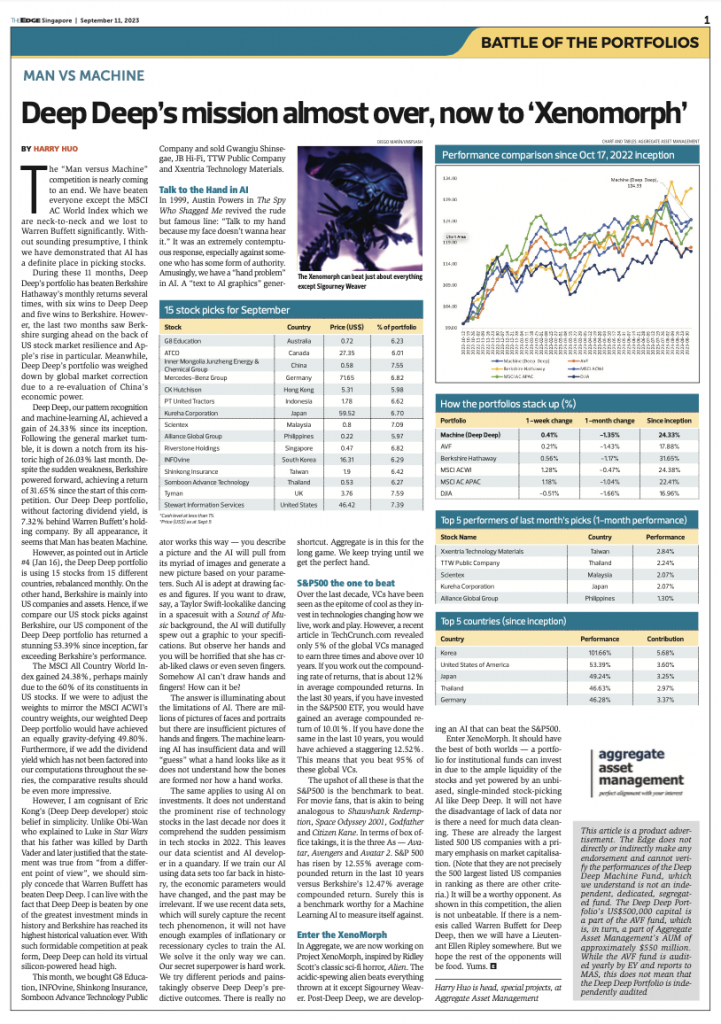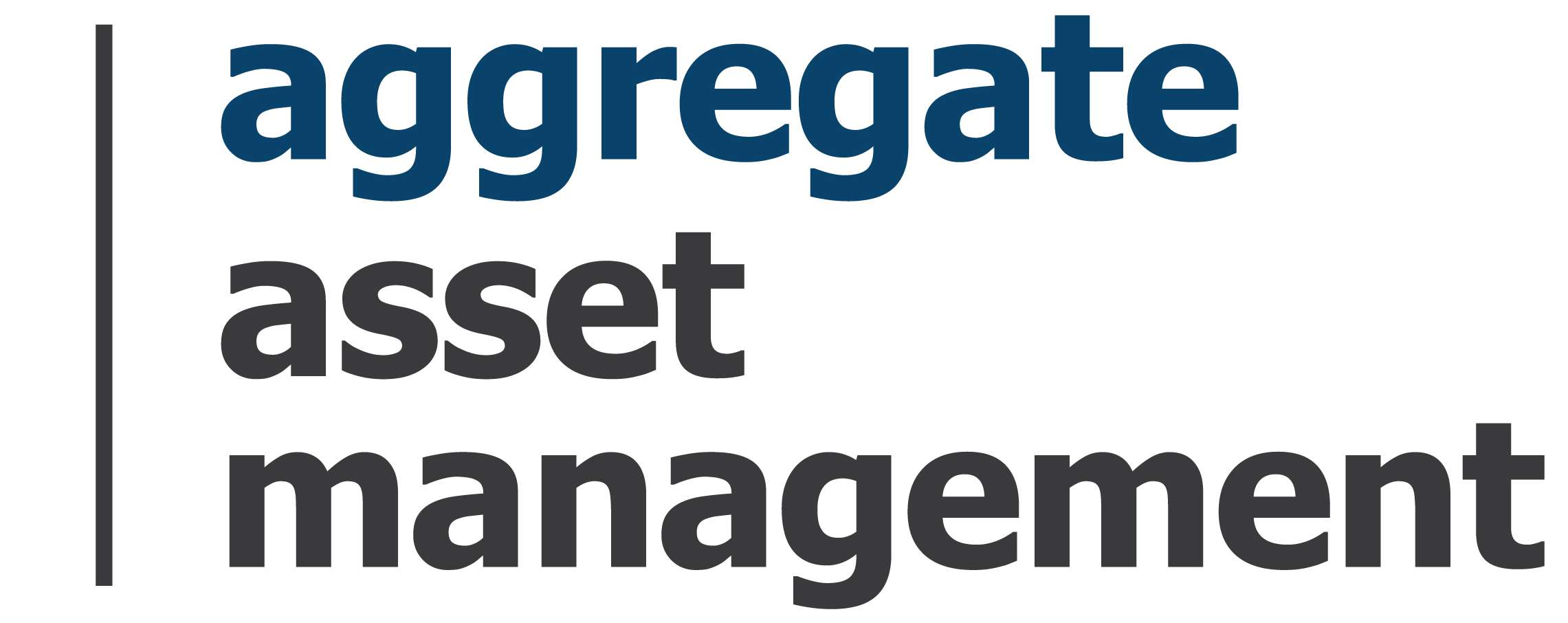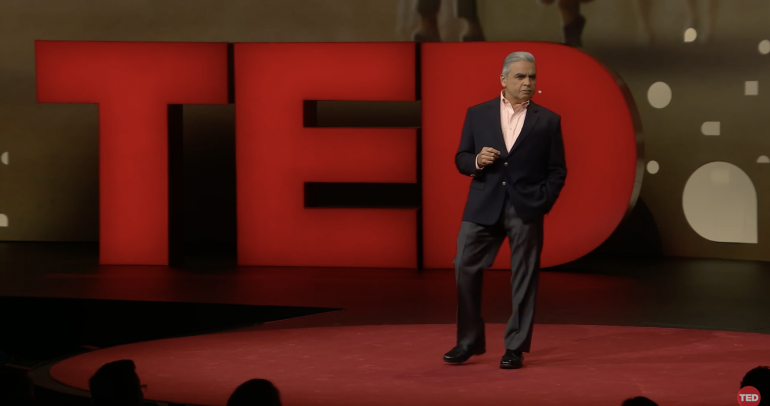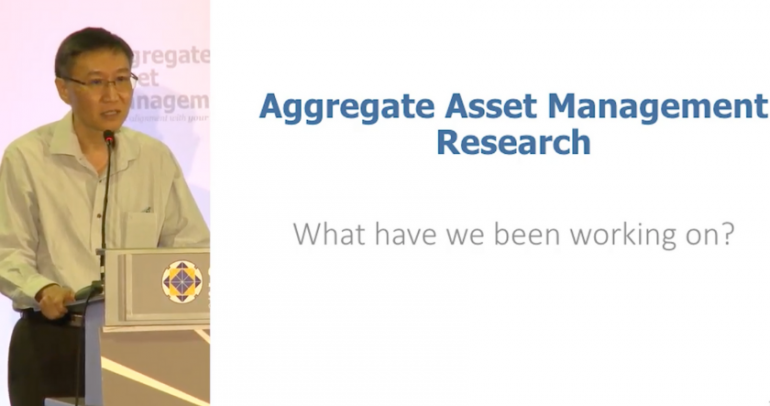The “Man versus Machine” competition is nearly coming to an end. We have beaten everyone except the MSCI AC World Index which we are neck-to-neck and we lost to Warren Buffett significantly. Without sounding presumptive, I think we have demonstrated that AI has a definite place in picking stocks.
During these 11 months, Deep Deep’s portfolio has beaten Berkshire Hathaway’s monthly returns several times, with six wins to Deep Deep and five wins to Berkshire. However, the last two months saw Berkshire surging ahead on the back of US stock market resilience and Apple’s rise in particular. Meanwhile, Deep Deep’s portfolio was weighed down by global market correction due to a re-evaluation of China’s economic power.
Deep Deep, our pattern recognition and machine-learning AI, achieved a gain of 24.33% since its inception. Following the general market tumble, it is down a notch from its historic high of 26.03% last month. Despite the sudden weakness, Berkshire powered forward, achieving a return of 31.65% since the start of this competition. Our Deep Deep portfolio, without factoring dividend yield, is 7.32% behind Warren Buffett’s holding company. By all appearance, it seems that Man has beaten Machine.
However, as pointed out in Article #4 (Jan 16), the Deep Deep portfolio is using 15 stocks from 15 different countries, rebalanced monthly. On the other hand, Berkshire is mainly into US companies and assets. Hence, if we compare our US stock picks against Berkshire, our US component of the Deep Deep portfolio has returned a stunning 53.39% since inception, far exceeding Berkshire’s performance.

The MSCI All Country World Index gained 24.38%, perhaps mainly due to the 60% of its constituents in US stocks. If we were to adjust the weights to mirror the MSCI ACWI’s country weights, our weighted Deep Deep portfolio would have achieved an equally gravity-defying 49.80%. Furthermore, if we add the dividend yield which has not been factored into our computations throughout the series, the comparative results should be even more impressive.
However, I am cognisant of Eric Kong’s (Deep Deep developer) stoic belief in simplicity. Unlike Obi-Wan who explained to Luke in Star Wars that his father was killed by Darth Vader and later justified that the statement was true from “from a different point of view”, we should simply concede that Warren Buffett has beaten Deep Deep. I can live with the fact that Deep Deep is beaten by one of the greatest investment minds in history and Berkshire has reached its highest historical valuation ever. With such formidable competition at peak form, Deep Deep can hold its virtual silicon-powered head high.
This month, we bought G8 Education, INFOvine, Shinkong Insurance, Somboon Advance Technology Public Company and sold Gwangju Shinsegae, JB Hi-Fi, TTW Public Company and Xxentria Technology Materials.

Talk to the Hand in AI
In 1999, Austin Powers in The Spy Who Shagged Me revived the rude but famous line: “Talk to my hand because my face doesn’t wanna hear it.” It was an extremely contemptuous response, especially against someone who has some form of authority.
Amusingly, we have a “hand problem” in AI. A “text to AI graphics” generator works this way — you describe a picture and the AI will pull from its myriad of images and generate a new picture based on your parameters. Such AI is adept at drawing faces and figures. If you want to draw, say, a Taylor Swift-look alike dancing in a spacesuit with a Sound of Music background, the AI will dutifully spew out a graphic to your specifications. But observe her hands and you will be horrified that she has crab-liked claws or even seven fingers. Somehow AI can’t draw hands and fingers! How can it be?
The answer is illuminating about the limitations of AI. There are millions of pictures of faces and portraits but there are insufficient pictures of hands and fingers. The machine learning AI has insufficient data and will “guess” what a hand looks like as it does not understand how the bones are formed nor how a hand works.
The same applies to using AI on investments. It does not understand the prominent rise of technology stocks in the last decade nor does it comprehend the sudden pessimism in tech stocks in 2022. This leaves our data scientist and AI developer in a quandary. If we train our AI using data sets too far back in history, the economic parameters would have changed, and the past may be irrelevant. If we use recent data sets, which will surely capture the recent tech phenomenon, it will not have enough examples of inflationary or recessionary cycles to train the AI.
We solve it the only way we can. Our secret superpower is hard work. We try different periods and painstakingly observe Deep Deep’s predictive outcomes. There is really no shortcut. Aggregate is in this for the long game. We keep trying until we get the perfect hand.

S&P500 the one to beat
Over the last decade, VCs have been seen as the epitome of cool as they invest in technologies changing how we live, work and play. However, a recent article in TechCrunch.com revealed only 5% of the global VCs managed to earn three times and above over 10 years.
If you work out the compounding rate of returns, that is about 12% in average compounded returns. In the last 30 years, if you have invested in the S&P500 ETF, you would have gained an average compounded return of 10.01%. If you have done the same in the last 10 years, you would have achieved a staggering 12.52%. This means that you beat 95% of these global VCs.
The upshot of all these is that the S&P500 is the benchmark to beat. For movie fans, that is akin to being analogous to Shawshank Redemption, Space Odyssey 2001, Godfather and Citizen Kane. In terms of box office takings, it is the three As — Avatar, Avengers and Avatar 2. S&P 500 has risen by 12.55% average compounded return in the last 10 years versus Berkshire’s 12.47% average compounded return. Surely this is a benchmark worthy for a Machine Learning AI to measure itself against.
Enter the XenoMorph
In Aggregate, we are now working on Project XenoMorph, inspired by Ridley Scott’s classic sci-fi horror, Alien. The acidic-spewing alien beats everything thrown at it except Sigourney Weaver.
Post-Deep Deep, we are developing an AI that can beat the S&P500. Enter XenoMorph. It should have the best of both worlds — a portfolio for institutional funds can invest in due to the ample liquidity of the stocks and yet powered by an unbiased, single-minded stock-picking AI like Deep Deep. It will not have the disadvantage of lack of data nor is there a need for much data cleaning. These are already the largest listed 500 US companies with a primary emphasis on market capitalisation. (Note that they are not precisely the 500 largest listed US companies in ranking as there are other criteria.)
It will be a worthy opponent. As shown in this competition, the alien is not unbeatable. If there is a nemesis called Warren Buffett for Deep Deep, then we will have a Lieutenant Ellen Ripley somewhere. But we hope the rest of the opponents will be food. Yums.
Harry Huo is head, special projects, at Aggregate Asset Management

This article is a product advertisement. The Edge does not directly or indirectly make any endorsement and cannot verify the performances of the Deep Deep Machine Fund, which we understand is not an independent, dedicated, segregated fund. The Deep Deep Portfolio’s US$500,000 capital is a part of the AVF fund, which is, in turn, a part of Aggregate Asset Management’s AUM of approximately $550 million. While the AVF fund is audited yearly by EY and reports to MAS, this does not mean that the Deep Deep Portfolio is independently audited.
To view all articles in the Man vs Machine Challenge series, please click here.
This article was published on The Edge Singapore on 7 September, 2023.




